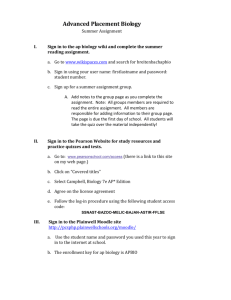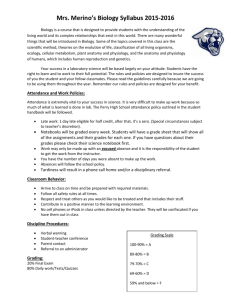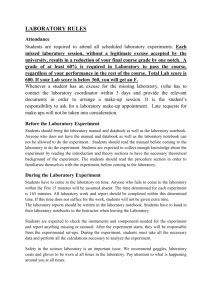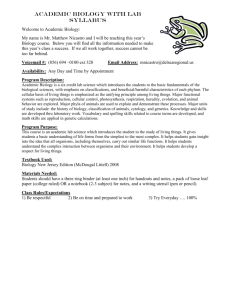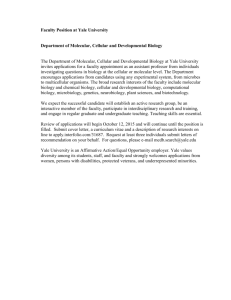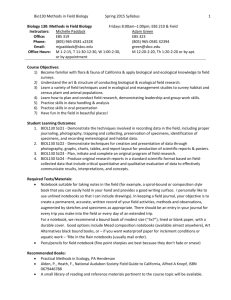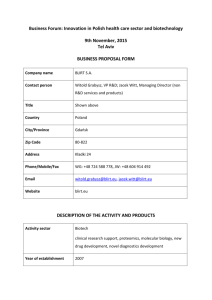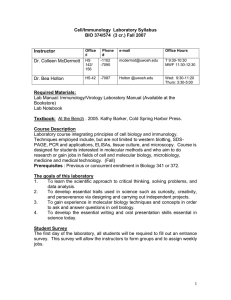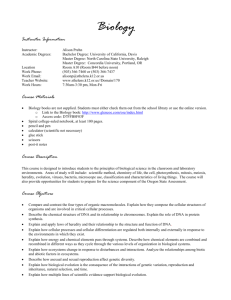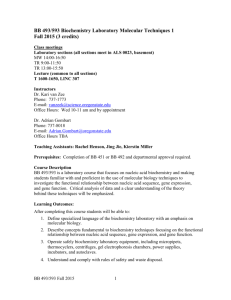BIOL 351: Molecular Cell Biology, Laboratory Section 2
advertisement
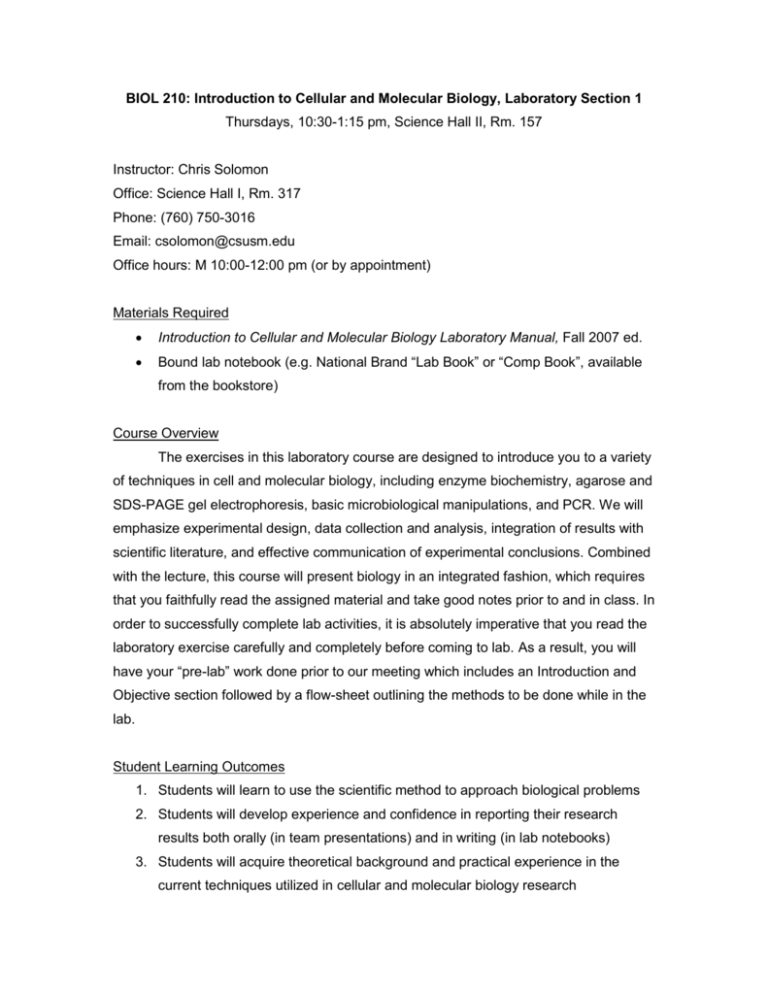
BIOL 210: Introduction to Cellular and Molecular Biology, Laboratory Section 1 Thursdays, 10:30-1:15 pm, Science Hall II, Rm. 157 Instructor: Chris Solomon Office: Science Hall I, Rm. 317 Phone: (760) 750-3016 Email: csolomon@csusm.edu Office hours: M 10:00-12:00 pm (or by appointment) Materials Required Introduction to Cellular and Molecular Biology Laboratory Manual, Fall 2007 ed. Bound lab notebook (e.g. National Brand “Lab Book” or “Comp Book”, available from the bookstore) Course Overview The exercises in this laboratory course are designed to introduce you to a variety of techniques in cell and molecular biology, including enzyme biochemistry, agarose and SDS-PAGE gel electrophoresis, basic microbiological manipulations, and PCR. We will emphasize experimental design, data collection and analysis, integration of results with scientific literature, and effective communication of experimental conclusions. Combined with the lecture, this course will present biology in an integrated fashion, which requires that you faithfully read the assigned material and take good notes prior to and in class. In order to successfully complete lab activities, it is absolutely imperative that you read the laboratory exercise carefully and completely before coming to lab. As a result, you will have your “pre-lab” work done prior to our meeting which includes an Introduction and Objective section followed by a flow-sheet outlining the methods to be done while in the lab. Student Learning Outcomes 1. Students will learn to use the scientific method to approach biological problems 2. Students will develop experience and confidence in reporting their research results both orally (in team presentations) and in writing (in lab notebooks) 3. Students will acquire theoretical background and practical experience in the current techniques utilized in cellular and molecular biology research Lab Grading 2 laboratory notebook evaluations: 75 pts each 3 (unannounced) quizzes: 15 pts each 195 pts total See pages 5-7 in the lab manual for specific guidance on keeping a laboratory notebook. Note that laboratory preparation and participation will also be taken into account when evaluating the laboratory notebook. Absence from a lab will result in a minimum of 15 points being deducted from your lab grade Late submission of any assignment results in the loss of 15 points per late day No extra credit will be given Academic Honesty and Integrity Students are responsible for honest completion and representation of their work. Plagiarism will not be tolerated in the lab notebooks. If you have copied or modified someone else’s work (e.g. from your lab group, from your friend who took BIOL 210 last year) you have plagiarized. The instructor reserves the right to discipline any student for academic dishonesty and plagiarism, in accordance with the general rules and regulations of the university. Disciplinary action may include the assignment of a failing grade for an exam, a lab report, or the class as a whole. Disabled Student Services Students with disabilities who require reasonable accommodations must be approved for services by providing appropriate and recent documentation to the Office of Disabled Student Services (DSS). This office is located in Craven Hall 5205, and can be contacted by phone at (760) 750-4905, or TTY (760) 750-4909. Students authorized by DSS to receive reasonable accommodations should meet with me during my office hours in order to ensure confidentiality. Lab Policies No food or drink in the lab Clean up after yourself before you leave the lab: place all used glassware in the wash basins and put pipetmen back in their stands Wash your hands thoroughly before leaving lab Know the location of the fire extinguisher, eye wash, chemical shower, and first aid kit, and know how to use them TENTATIVE LABORATORY SCHEDULE Date: 1/31 Laboratory Activities LAB 1: PRINCIPLES OF SCIENTIFIC INVESTIGATION Other activities: Course introduction, team assignments, lab notebooks, scientific notation, dilutions, and metrics 2/7 LAB 2: ASEPTIC TECHNIQUE: PURE CULTURES, PIPETTING AND DILUTIONS 2/14 LAB 3: MICROBIAL GROWTH AND ANALYSIS Other activities: Lab 2 results and analysis, class discussion 2/21 LAB 3 WEEK 2: TEAM DATA ANALYSES AND DISCUSSION Other activities: Microbial growth kinetics and log graph construction 2/28 LAB 4: METABOLISM I: MECHANISMS AND CONTROL OF ENZYME ACTIVITY 3/6 LAB 8: TECHNIQUES IN MOLECULAR BIOLOGY: CRIME SCENE FORENSICS INVESTIGATION Other activities: Lab 4 analysis and discussion 3/13 LAB 8: CRIME SCENCE FORENSICS INVESTIGATION: PERIOD 2 Other activities: Team data analysis 3/20 LAB 5A: METABOLISM II: MEASURING RESPIRATORY/FERMENTATIVE ACTIVITY Lab notebooks due (through lab 8) 3/27 LAB 5B: METABOLISM II: MEASURING RESPIRATORY/FERMENTATIVE ACTIVITY Other activities: Lab 5A team presentations 4/10 LAB 6: PHOTOSYNTHESIS: OBTAINING ABSORPTION SPECTRA AND DETERMINATION OF PIGMENT COMPOSITION 4/17 4/24 5/1 LAB 7A: ANALYSIS OF SDS-PAGE PROTEIN PROFILES IN CHEMOTROPHICALLY VERSUS PHOTOTROPHICALLY-GROWN CELLS Part 1: Assay for determination of cellular protein content. Other activities: Lab 6 team presentations LAB 7B: ANALYSIS OF SDS-PAGE PROTEIN PROFILES IN CHEMOTROPHICALLY VERSUS PHOTOTROPHICALLY GROWN CELLS Part 2: Resolving proteins using SDS PAGE LAB WRAP-UP Other activities: Lab review for final exam (question/answer format). Lab notebooks due
